Rabbinical and Cantorial Class of 2023/5783 Scholarship
Your gift will support the Class of 2023 Lea Andersen Memorial Scholarship Fund which will be awarded to a student or students entering Hebrew College’s ordination programs in the fall of 2023.
Learn about Lea
Born and raised in Central Florida, Lea discovered her love for Torah and began to connect with her Jewish neshamah when she was a student at New College of Florida in Sarasota. Lea’s passion for Jewish life brought her to Asheville, NC where she participated in the Tzedek Fellowship and worked for the JCC as well as to Jerusalem where she studied Hebrew and Arabic and volunteered in peace-building efforts between Israelis and Palestinians through Achvat Amim: Solidarity of Nations. Simultaneously, Lea felt called to live out her personal gender identity as a transgender woman and to serve the Jewish people as a teacher, organizer, and spiritual guide. She began her rabbinical studies at HUC in Jerusalem before transferring to Hebrew College where she passionately devoted herself to studying halakha and aggadah, kabballah, and hassidut, and everything on which she could get her hands. She became a leader in several minyanim, a mikvah guide at Mayyim Hayyim, and an inspiration to many through her devotion to living her life with authenticity and integrity. She authored her own Midrashim which elevated trans experiences of biblical characters and the voices of biblical women. Lea encouraged others to join her in sanctifying their gender transitions through berakhot, tefillah, and mikvah. Lea’s unique presence is already dearly missed by so many of us who were blessed to know and love her. Her classmates hope that this fund will serve as a modest way to honor her life and legacy.
Elyse Pincus Abrahams
Eric Feld
Lisa Feld
Micah Friedman
Matt Goldberg
Joshua Greenberg
Ryan Leszner
Alex Matthews
Jackson Mercer
Kochava Munro
Josh Schreiber
Jenna Shaw
Danny Stein
Ashira Stevens
Moshe Webber
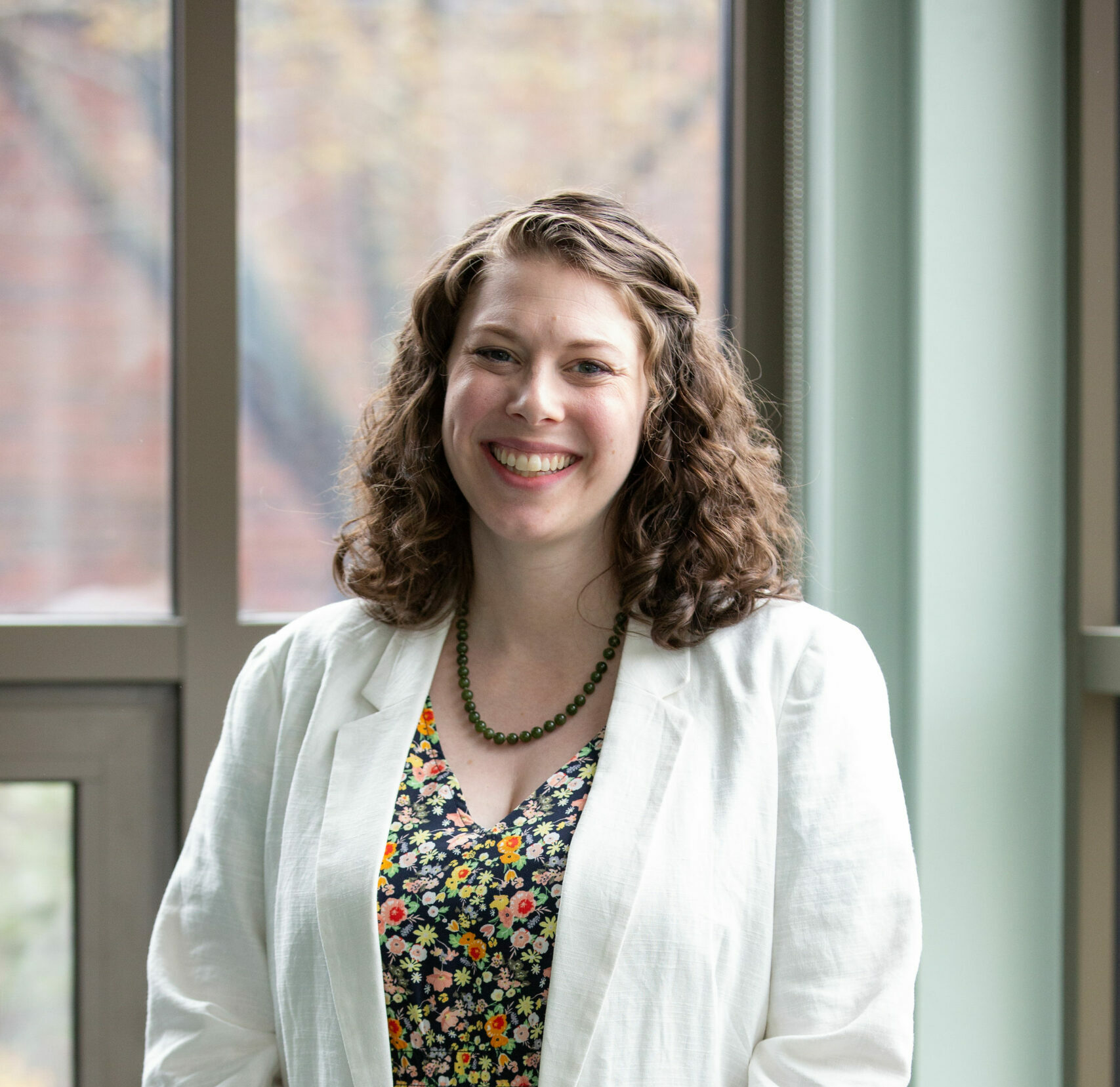
Elyse Pincus Abrahams
Praying by Mary Oliver
It doesn’t have to be
the blue iris, it could be
weeds in a vacant lot, or a few
small stones; just
pay attention, then patch
a few words together and don’t try
to make them elaborate, this isn’t
a contest but the doorway
into thanks, and a silence in which
another voice may speak.
A copy of this poem lives in my prayer book, and before I pray the Amidah, I take a moment to read, reflect, and listen to Mary Oliver’s words. These words have been a constant for me in my rabbinical school career and have reminded me of two things I hold dear: expressing gratitude and listening.
When I started my rabbinic journey, I often struggled with fixed liturgy in prayer and feeling connected to the words. I wanted to see myself and God in the texts but struggled to keep up with what was on the pages. Mary Oliver’s poem in conversation with Psalm 118:24, a verse recited during Hallel, has guided me on my journey towards finding myself in prayer and Jewish texts. These texts remind me of the importance of listening, being present, and expressing gratitude. These aspects are at the heart of my prayer life, relationship with others, and role in the rabbinate.
זֶה־הַ֭יֹּום עָשָׂ֣ה יְהוָ֑ה נָגִ֖ילָה וְנִשְׂמְחָ֣ה בֹֽו׃
This is the day that the LORD has made —
let us exult and rejoice in it.
Psalm 118:24
I try to take this verse to heart by finding joy and gratitude each and every day. However, it can often be challenging. Through the pandemic, the deaths of family and friends, and witnessing the suffering of so many, it wasn’t always easy to find joy and gratitude daily. Fortunately, I found great wisdom from the seniors I had the privilege to work with. Every day they would teach me to notice and appreciate the world around me, even if it was as simple as waking up and being present for the day. Through our conversations and hearing their life stories, I learned to appreciate the seemingly mundane and not take things for granted.
This journey wouldn’t have been possible without the many people and communities who have been a part of my life and for which their love, support, and wisdom have helped me get to this moment.
To the communities I have had the privilege to serve: 2Life Communities, Hebrew Senior Life, the women’s group of Congregation Ahavas Achim, and Congregation Chaverim, thank you for helping me find my rabbinic voice and giving me opportunities to grow into the rabbi I am today. In many different ways, this work taught me to strive to build loving relationships within communities, to make Judaism accessible in meaningful ways to each individual, and to the importance of ritual.
To my teachers at Hebrew College, thank you for seeing the potential in me before I even realized it myself. To my chaplaincy teachers and mentors, Rabbi Beth Naditch and Reverend Mary Martha, under your guidance and wisdom, without question, CPE helped me grow into the person and rabbi that I am today. You helped me learn how to truly listen to others and, most importantly, myself. To my spiritual director, Julie Leavitt, among the countless lessons I learned from our time together, thank you for helping me embrace my tears and to see them as a form of prayer. To my classmates, especially the Rab Bros that I started Mekerot with, thank you for the constant support and encouragement and for grappling with the true meaning of pluralism.
Finally, I cannot express enough gratitude towards my family. To my parents, Debbie and Barry, my parents-in-law, Jill and Ken, and my sister and brother-in-law, Katie and Michael, thank you for always being my cheerleaders and a never-ending source of love and support. To my husband and best friend, Harry, thank you for being my partner in life and helping me take on all the challenges that life has thrown our way over the last six years. More importantly, thank you for filling our home with laughter and love, which always propels me forward and extends into everything I do. Finally, to my son, Gideon, thank you for already teaching me patience and to take one day at a time. I can’t wait to explore the world with you.
Placement
Assistant Rabbi, Temple Beth Shalom (Needham, MA)
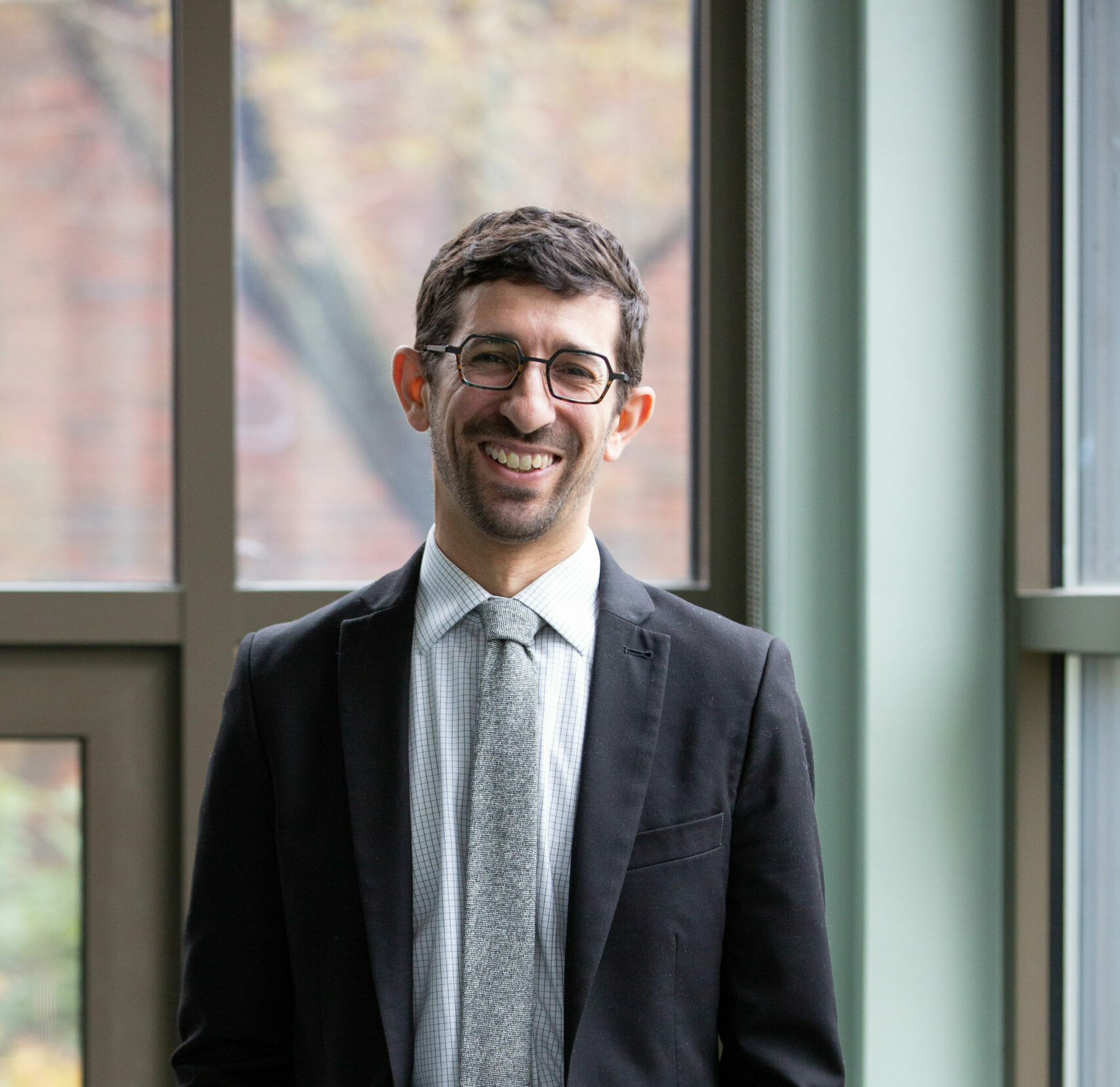
Eric Feld
רַבִּי נְחוּנְיָא בֶּן הַקָּנָה הָיָה מִתְפַּלֵּל בִּכְנִיסָתוֹ
…לְבֵית הַמִּדְרָשׁ
תָּנוּ רַבָּנַן: בִּכְנִיסָתוֹ מַהוּ אוֹמֵר? ״יְהִי רָצוֹן מִלְּפָנֶיךָ
הִי אֱלֹהַי שֶׁלֹּא יֶאֱרַע דְּבַר תַּקָּלָה עַל יָדִי, וְלֹא אֶכָּשֵׁל
בִּדְבָר הֲלָכָה, וְיִשְׂמְחוּ בִּי חֲבֵרַי, וְלֹא אוֹמַר עַל טָמֵא
טָהוֹר, וְלֹא עַל טָהוֹר טָמֵא. וְלֹא יִכָּשְׁלוּ חֲבֵרַי בִּדְבַר
הֲלָכָה, וְאֶשְׂמַח בָּהֶם.״
Rabbi Nehunya ben Hakana would recite a brief prayer upon his entrance into the study hall…Upon his entrance, what does he say? May it be Your will, Lord my God, that no mishap (in determining the halakha) transpires because of me, and that I not fail in any matter of halakha, and that my colleagues (who learn with me) will rejoice in me. And that I neither declare pure that which is impure, nor impure that which is pure, and that my colleagues will not stumble in any matter of halakha, and that I will rejoice in them.
Berakhot 28b
For the past six years, I have said this blessing every time that I have sat down in the Beit Midrash to learn with my chevruta, whether virtually or in person. Rabbi Nehunya ben Hakana’s bracha is an important reminder to me that the act of learning Torah and the Jewish legal precepts of halakha are ultimately rooted in relationships. I am drawn to the notion of saying a bracha for the success of another—especially one whose worldview may be diametrically opposite one’s own. To say a blessing for another is inherently about offering ourselves, which is all that we have, to the other. True to the second letter “bet”, which begins the words bracha and bereshit—the word for God’s role in creation—God is the One who brings duality together.
One of the most enduring lessons I have received from my teachers at Hebrew College is the immense power of the words d’var acher. This tiny two-word phrase, which appears countless times in the rabbinic literature to introduce another opinion, celebrates the richness of pluralism throughout generations of Jewish wisdom and the sacred process of learning. Lifting up one another and celebrating a diversity of voices is a core part of Divine service. To me, this is the essence of devotional life.
The Torah obliges us to say a separate bracha “when you have eaten and are nourished”. When we learn Torah in love and amazement, it nourishes and sustains us. In this moment of overflowing satisfaction, I offer my abundant gratitude to the Divine for bringing my colleagues and me together into this good land of spiritual and intellectual sustenance. I am also grateful to those who have been on this journey and who continue onward with us in our hearts.
Within the traditional framework of Jewish prayer, each day begins with the words modeh ani—I thank you—a recognition that we as individuals are not alone in the world. I am overwhelmed with appreciation for so many special individuals who have made this chapter in life both possible and meaningful with their abounding love, encouragement, and unwavering support. To my parents, Linda and Neil, who have always enthusiastically leaped at opportunities to prioritize my educational journey while patiently trusting and challenging my own spiritual growth process—modeh ani. To my Leighton family, Dee, Cary, and Kyle, who have given so much of yourselves in support of this mission out of your own abundant kindness—modeh ani. To my sisters, Merryl and Kim, and to dear friends from my time in Chapel Hill, Boston, Glenburn, and Atlanta, who have taught me the value of living in relationship and sharing in our world together—modeh ani. To the sacred kehillah at Congregation Beth Shalom in Dunwoody, Georgia—modeh ani. I am deeply humbled and honored by your trust and look forward to vigorously serving you.
No words will ever adequately express the admiration and gratitude that I will forever feel toward you, Ashley, my beloved wife and most important teacher for all things in life. For all of your sacrifices, for all of your positivity and creativity through all aspects of this journey, and for all of your heroic efforts to support our family, thank you for making this dream possible. And to Ezra and Isaac, whose own individual spiritual journeys I hope to enrich, thank you for making mine meaningful with your love, your joyful curiosity, and for the importance of the question, “Why?”
“Upon his exit, what did he (Rabbi Nehunya ben Hakana) say? I give thanks before You, Lord my God, that you have placed my lot among those who sit in the study hall” (Berakhot 28b). It has been the privilege of my life to learn with so many talented teachers and colleagues. You have each opened my eyes in immeasurable and exciting ways, and your Torah is forever bound up within mine. Hadran alach…La b’alma hadayn v’lo b’alma d’atei.
Placement
Congregation Beth Shalom, (Dunwoody, Georgia)
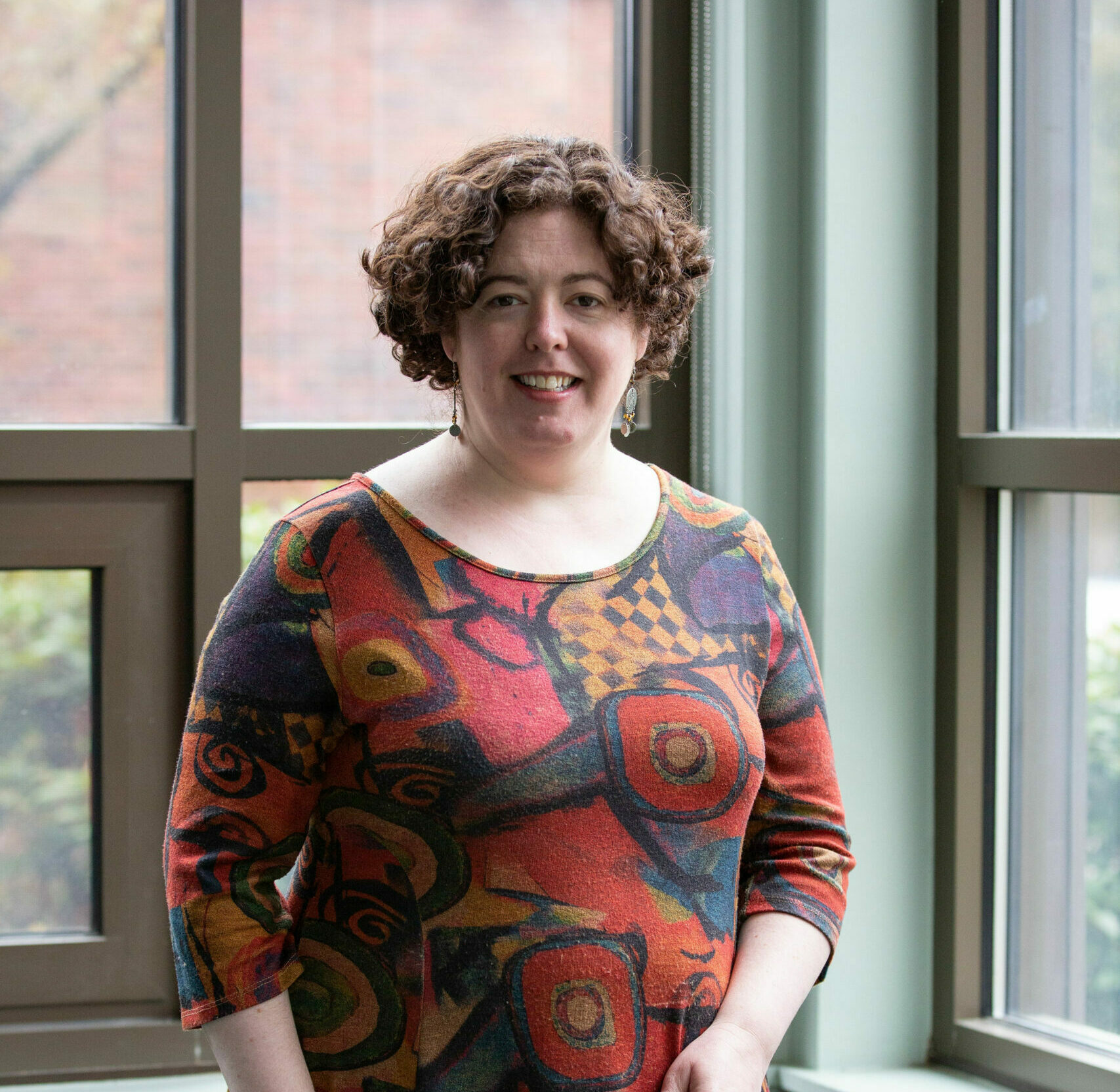
Lisa Feld
הָפַ֣כְתָּ מִסְפְּדִי֮ לְמָחוֹל לִ֥֫י פִּתַּ֥חְתָּ שַׂקִּ֑י
וַֽתְּאַזְּרֵ֥נִי שִׂמְחָֽה׃
:לְמַעַן יְזַמֶּרְךָ כָבוֹד וְלֹא יִדֹּם יְהֹוָה אֱלֹהַי לְעוֹלָם אוֹדֶךָּ
You turned my mourning into dancing, You undid my sackcloth and girded me with joy, that my whole being might sing hymns to You endlessly; O LORD my God, I will praise You forever.
Psalm 30:12-13
Throughout Psalm 30, the psalmist’s words slip back and forth between comfort and abandonment, joy and despair. It grounds me to begin my morning prayers with this model for remaining in conversation with God, both in the times when things are going well and the Divine feels easily accessible, and in moments when meaning and connection are harder to find. Through it all, I keep reaching out, keep singing.
Immense gratitude to my parents for their wisdom and support (not to mention journaling prompts and Talmud Torah!); for my brother Uri, cheering me on every step of the way and teasing me when I needed it; for my wealth of aunts, uncles, and cousins who keep asking about my learning and showing up to kvell; for the friends who have welcomed all the changes the past five years have brought.
Thank you to my hevrusas, my fellow students, and my teachers at the Conservative Yeshiva in Jerusalem and at Hebrew College here in Boston, and my CPE supervisors and cohort-mates at Hebrew Senior Life and Massachusetts General Hospital: it’s been a privilege going on this journey with you, and there is nothing that gives me more joy than teaching in your names. I am so grateful to Rabbi Leonard Gordon for taking me under his wing—you have modeled for me not just how to be a congregational rabbi, but why—and to the congregation of B’nai Tikvah in Canton, MA, who have shaped me and become my home community.
Placement
Rabbi, B’nai Tikvah (Canton, MA)
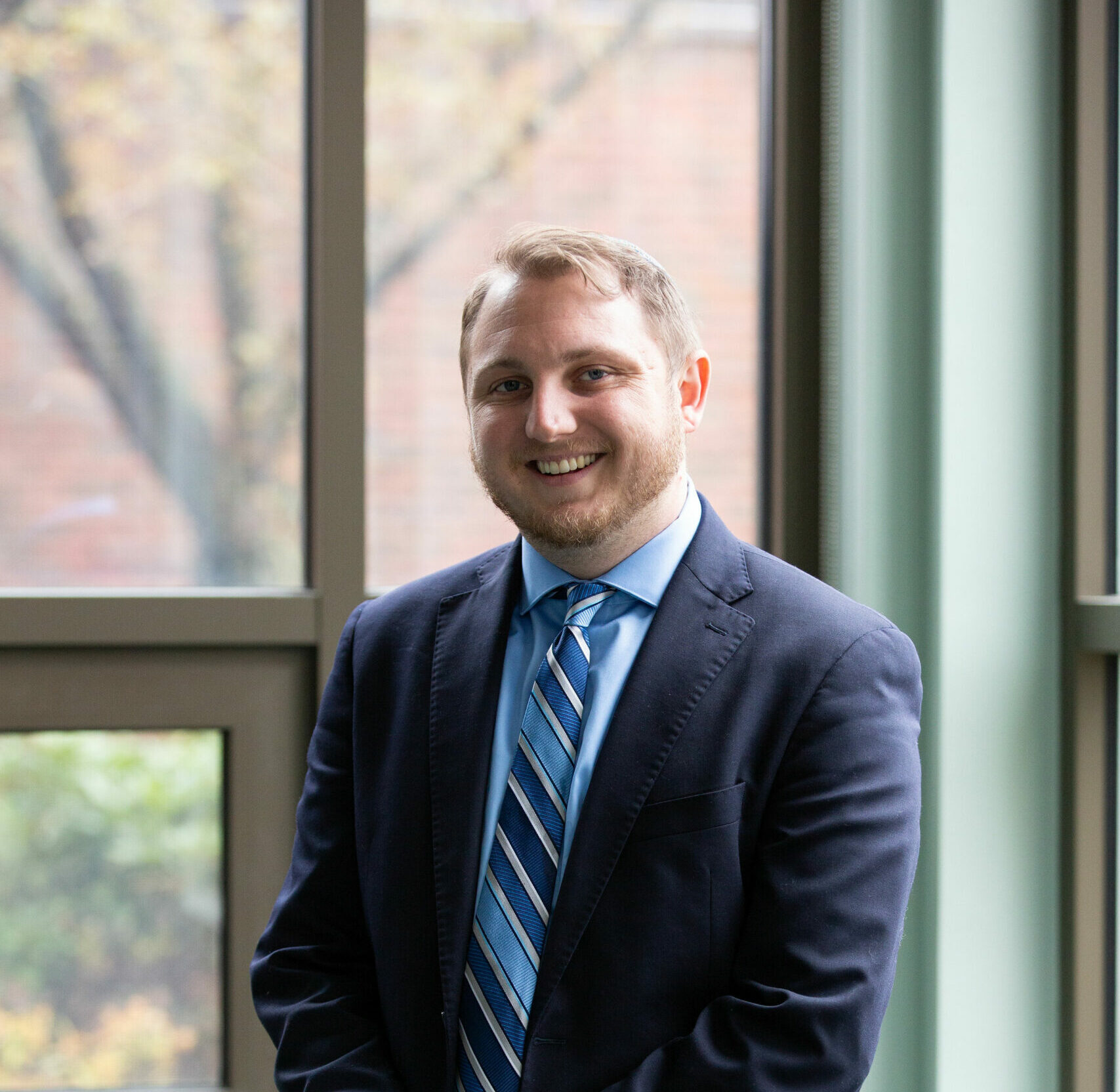
Micah Friedman
״שויתי ה׳ לנגדי תמיד״ (תהילים טז:) הוא כלל
גדול בתורה
I place YHVH before me constantly (Psalm 16:8) — this is a great principle of Torah.
Rem”a, Shulhan Arukh Orah Hayyim 1:1
אפילו כשהולך לעסקיו יקיים ״שויתי ה׳ לנגדי
תמיד״ (תהילים טו:ח) ו״בכל דרכיך דעהו״
(משלי ג:ו)
Even when going to work, one should fulfill “I place YHVH before me constantly” (Psalm 16:8) and “In all of your ways know Him” (Proverbs 3:6)
Keter Shem Tov 217b
These two teachings by two great Eastern European rabbis serve as guiding lights for me as I cross this monumental threshold. Rabbi Moshe Isserless (Rem”a) zt”l, the great 16th century CE rabbi of Krakow, authored an extensive halakhic work which reported the traditions of Eastern European Jewry. In great detail, he teaches about the various practices and perspectives of Ashkenazi communities. Strikingly, in his very first comment, he emphasizes that the great principle of the Torah is to constantly place G!d before us. This, I believe, is what all the detailed practices of Jewish tradition are designed to inculcate within our hearts and souls: we are always capable of becoming aware of the Presence of the One-Who-Was-Is-and-Will-Be.
In my time learning at Hebrew College, I have aspired to follow in the footsteps of the Rem”a. I have worked to appreciate each and every detail of our inherited practices and traditions while maintaining my focus on serving YHVH. Now, as I prepare to transition from a full-time student to a full-time worker, I take comfort in the teaching of the holy Ba’al Shem Tov zt”l. Even when we go about our business affairs, we have the opportunity to remain aware of the One Who Sustains All Life.
I first learned of this verse from Psalm 16 more than a decade ago when my teacher, Rabbi Jason Rosenberg, introduced me to Jewish meditation and Neo-Hasidism. In some ways, this began my journey on the path of spiritual seeking which led me to Hebrew College. I am in great debt to him and Congregation Beth Am of Tampa, FL, the community in which I was raised and with whom I first felt the power of an intergenerational Jewish community. I am grateful to all of the spaces and people who were a part of my journey to this point. I am particularly grateful to the Hebrew College community, both my teachers and peers, who have supported me through much learning and growth. Most of all, I am thankful to my parents, Bob and Cathy, who chose to invest in cultivating within me a deep and heartfelt appreciation for Judaism, community, and learning.
As many, varied Jewish communities have guided me, I pray that I may be blessed to serve as a guide for others who hope to find their way within the world of Torah and Mitzvot.
Placement
Rabbi, Temple Israel (Vestal, NY)
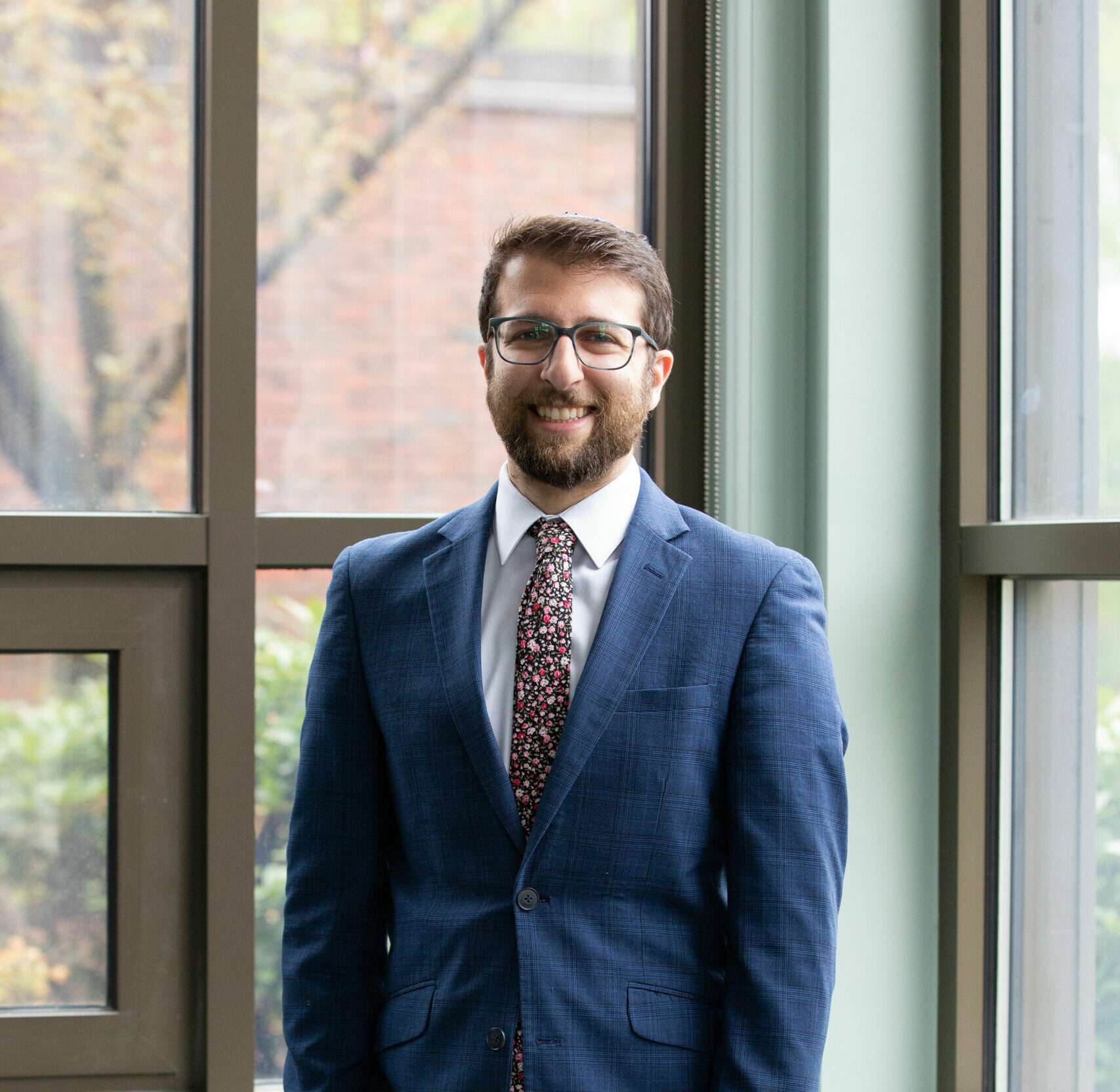
Matt Goldberg
כִּי צָרִיךְ כָּל אָדָם לוֹמַר: כָּל הָעוֹלָם לֹא נִבְרָא
אֶלָּא בִּשְׁבִילִי (סנהדרין לז). נִמְצָא, כְּשֶׁהָעוֹלָם
נִבְרָא בִּשְׁבִילִי, צָרִיךְ אֲנִי לִרְאוֹת וּלְעַיֵּן בְּכָל עֵת
,בְּתִקּוּן הָעוֹלָם, וּלְמַלְּאוֹת חֶסְרוֹן הָעוֹלָם
.לְהִתְפַּלֵּל בַּעֲבוּרָם
Every person must say to themselves: “the whole world was created for me.” Once I realize that the whole world was created for me, I must, at all times, be searching for ways to do tikkun olam, to fill the holes in the world, and to pray on her behalf.
Likutei Moharan 5:1
I often think about the classic teaching of Rabbi Simcha Bunim of Peschicha: every person must carry two pieces of paper in their pockets, one on each side. On one should be written, “I am but dust and ashes,” and on the other, “the world was created for me,” and life is a balancing act between these two statements.
The journey through rabbinical and cantorial school has been one of learning to live between these two statements; of learning to navigate between ego and humility. In moments of great excitement and (over–)confidence, it is important to remember how much more there is to learn; in moments of thinking I’ll never know enough, it is essential to remember how far I have come. Ultimately, there is a need for both.
In this moment, as I stand here about to be ordained, I feel like I am on top of the world. I have successfully finished a dual–ordination program, built a loving community here in Boston, and am about to begin a great job. This world was created for me. That does not mean I can sit back and be done. Rebbe Nahman teaches us about what we owe back to the world that has given us so much. What does it mean to use our opportunities and access to lift others up? To use our privilege—our pulpits, our voices—to fill the holes in the world?
These are the questions we are left with as we step out of school and into the real world. Now is our chance to bring together everything we have learned, all our expertise, and share it: not simply to amplify our own voices, but to empower and uplift every person in our communities. This is how we can live between both pieces of paper.
I am humbled and eternally grateful to the people who have gotten me to this point. To my hevruta, Elyse, with whom I have studied so many texts, and from whom I have learned so much about life. To my many cantorial classmates over the years, including, and especially, Kochava, who was along for the ride, particularly in this final year. To Julia (aka the Rav–Hazzan cohort), I appreciate your perspective and constant support, and I am forever grateful for you. And to my rabbinical school classmates: I would do this all over again if I knew I’d get to do it with you.
Mom, Dad, Kayla—we did it! Thank you for making me who I am. And to my partner and soon-to-be wife Elana, thank you for your constant care, support, and love.
You all, and many others not named, created this world for me. I look forward to continuing to learn from and with you all.
Placement
Assistant Rabbi, Beth El Synagogue (St. Louis Park, MN)
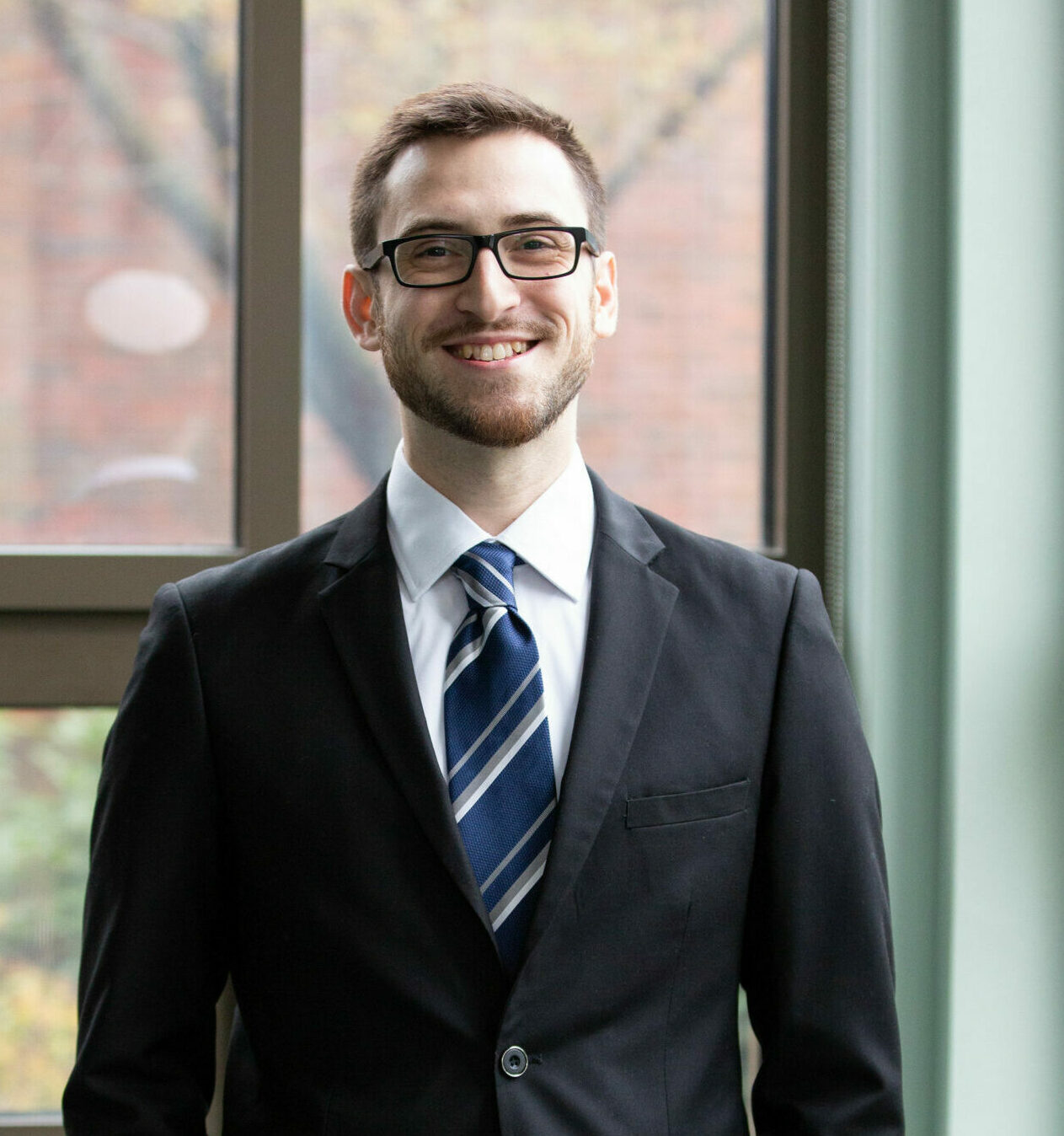
Joshua Greenberg
ִמְתֵּךְ׃ הַשָּׁמַיִם שָׁמַיִם לַיהֹוָה וְהָאָרֶץ
נָתַן לִבְנֵי־אָדָם
The heavens belong to the LORD, but the earth was given over to humankind.
Psalm 115:16
מְלֹא כָל־הָאָרֶץ כְּבוֹדוֹ…
The whole world is filled with the Divine Presence.
Isaiah 6:3
Here we see the Psalmist declare that while God may reign on High, the earth, the realm of our lived experience, is under human authority. It belongs to us.
And yet, the prophet reminds us when recounting his mystical vision that the entire earth is indeed filled with the Presence of the One, the Rhyme and Reason behind all that exists. If the earth truly belongs to us, to humankind, what is God doing here “filling the world”?
My understanding of what a rabbi “is” or “should be” has, to no surprise, changed over the last several years.
I feel content believing that how I currently understand the role I will shortly step into is not only—and perhaps not primarily—about being one well versed in the rhythms of Jewish thought and practice. At this time, I see that to be a rabbi means to live fully in this world, to lean entirely into the gamut of human experience, all the while trying to uncover the Presence that permeates everywhere and everything and every moment.
Our ancestor, Jacob, the one transformed into Yisra’el, the man who wrestled with God and his fellow man, said after waking from his dream of the heavenly ladder, “Surely, the LORD is in this place and I did not know it!” (Gen. 28:16). I believe that to step into the role of spiritual leader and teacher is to become attuned to where we can find the Divine in our lives, even in the most unlikely of places and interactions.
Qohelet, the author of Ecclesiastes, implores us to, “Eat your bread in gladness and drink your wine in joy…let your clothes always be freshly washed and your head never lack anointment. Enjoy happiness with the one you love all the fleeting days that have been given to you…” (Ecclesiastes 9:7-9). These are not complicated directions or obscure mystical teachings. Instead they are, as Moses teaches, “very near to you…” (Deuteronomy 30:14). They are the ways, at least some ways, of discovering the Divine in our day-to-day lives, of recognizing where the Totality of existence resides in the moments that define our lives as human beings.
As a rabbi, as a Jew, and as a spiritually inclined person, I hope to always be aware, and help others become aware, that we do not always need to ascend mountains or delve into the recesses of our souls to encounter Divinity. Instead, I hope to always be open to the possibility that the One can be experienced through the simple and sacred act of living.
I would not be here today without the unconditional and unwavering support and love of my family. My grandparents whose own presence I feel surrounding me today. My parents, my brother and sister-in-law, my wife and my in-laws, aunts, uncles, and cousins. My countless teachers, my hometown community, and the community I’ve made for myself these last six years. And of course, my cohort, together, we have reached this day. Thank you to everyone who helped me arrive at this moment. I love you all.
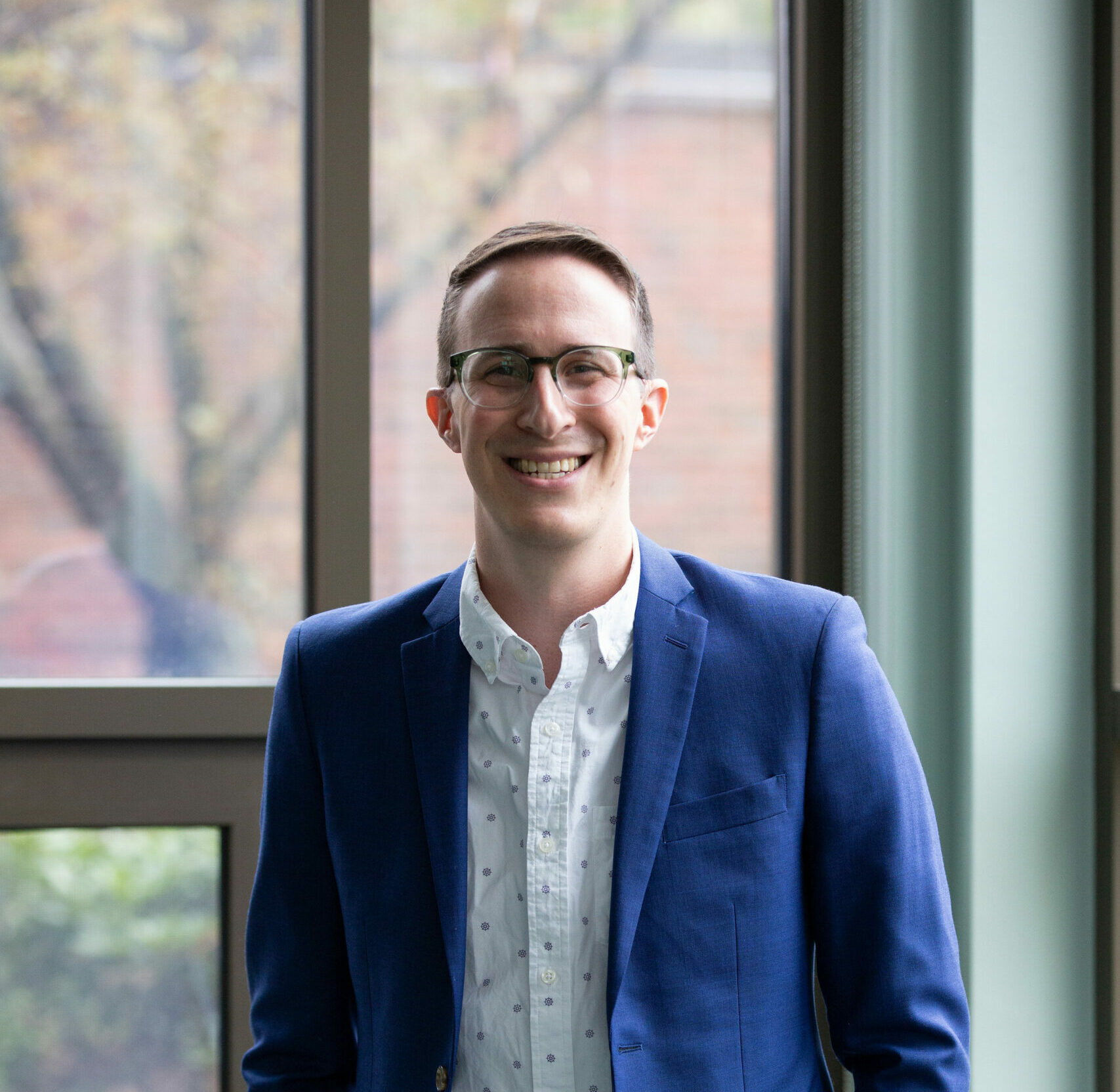
Ryan Leszner
וַיִּבְרָ֨א אֱלֹהִ֤ים ׀ אֶת־הָֽאָדָם֙ בְּצַלְמ֔וֹ בְּצֶ֥לֶם
אֱלֹהִ֖ים בָּרָ֣א אֹת֑וֹ זָכָ֥ר וּנְקֵבָ֖ה בָּרָ֥א אֹתָֽם׃
So God created humankind in God’s image, in the image of God did God create it, male and female God created them.
Genesis 1:27
I often think about what this verse means; that we are all created in the image of G-d. I believe that if we are all made in the image of G-d, we each have a piece of G-d inside us. A spark of goodness, holiness, and righteousness, a light we share with the world. Like a massive jigsaw puzzle, each piece is essential to the finished product. With even one missing piece, you don’t get to see the whole picture.
In Rabbi Isaac Luria’s Kabbalistic concept of shevirat ha-kelim, the breaking of the vessels, ten vessels contained God’s light. The vessels could not contain the light because of its holiness; therefore, they all shattered, scattering sparks all over the world. I like to think that each person holds one of these sparks and contains holiness. Therefore, my understanding of b’tzelem Elohim is that when we look and listen with intention, we can witness holiness when connected with God’s creations.
We are all b’tzelem Elohim, therefore we are all responsible for caring for all people. In taking this responsibility, we must exercise our gifts and passions and share them with the world around us while lifting up the light in others. Sharing our gifts allows permission for our most beautiful parts and the broken pieces to be seen, heard, and cared for. This is also present in Luria’s conception, as we are tasked with searching out and gathering the scattered sparks to bring wholeness to one another and the world.
This is how I envision my rabbinate. Recognizing the imperfections of each human and walking with them on their healing journey towards shleimut (completeness). Tending to the sparks, nurturing them, caring for them, and building them into beautiful flames. As well as providing a voice to those who don’t have the chance to share their voices, creating a world where their Torah can be heard. It is essential to see that spark in everyone, to listen to their personal Torah, and remember that we are all made b’tzelem Elohim.
I thank you for my life, body and soul.
Help me realize I am beautiful and whole.
I am perfect the way I am and a little broken too.
I will live each day as a gift I give to you.
Dan Nichols, adapted from Asher Yatzar
As I enter the world as a rabbi, I reflect on the tremendous opportunity I have had to be a part of this sacred Hebrew College community. People who have cared for me in my learning supported me when I couldn’t help myself and inspired me to be the best version of myself. I am forever changed by the generosity of my teachers and colleagues, who shared their light with me and, in turn, allowed me to share my spark with them.
Thank you to all the Jewish organizations that opened their doors to me to allow me to learn, be challenged, and grow. In particular, to the Temple Beth Elohim community, staff, and clergy, I cannot begin to thank you for your generosity, compassion, and willingness to show me the possibility of what a sacred Jewish community looks like. You have taught me so much about the holy work of walking with others on their Jewish journeys and caring for them.
I am blessed to be a part of a sacred community of loved ones. Thank you to my friends who saw my spark before I could even see it and for nurturing and tending to it. To my family, for all their support and instilling Jewish values within me, along with a love of Torah.
To Dalia, my partner in all parts of life, my most incredible support, advocate, and source of joy. To walk through life as your partner is the greatest blessing.
Placement
Director of Jewish Learning and Living, Congregation Darchei Noam (Toronto, Canada)
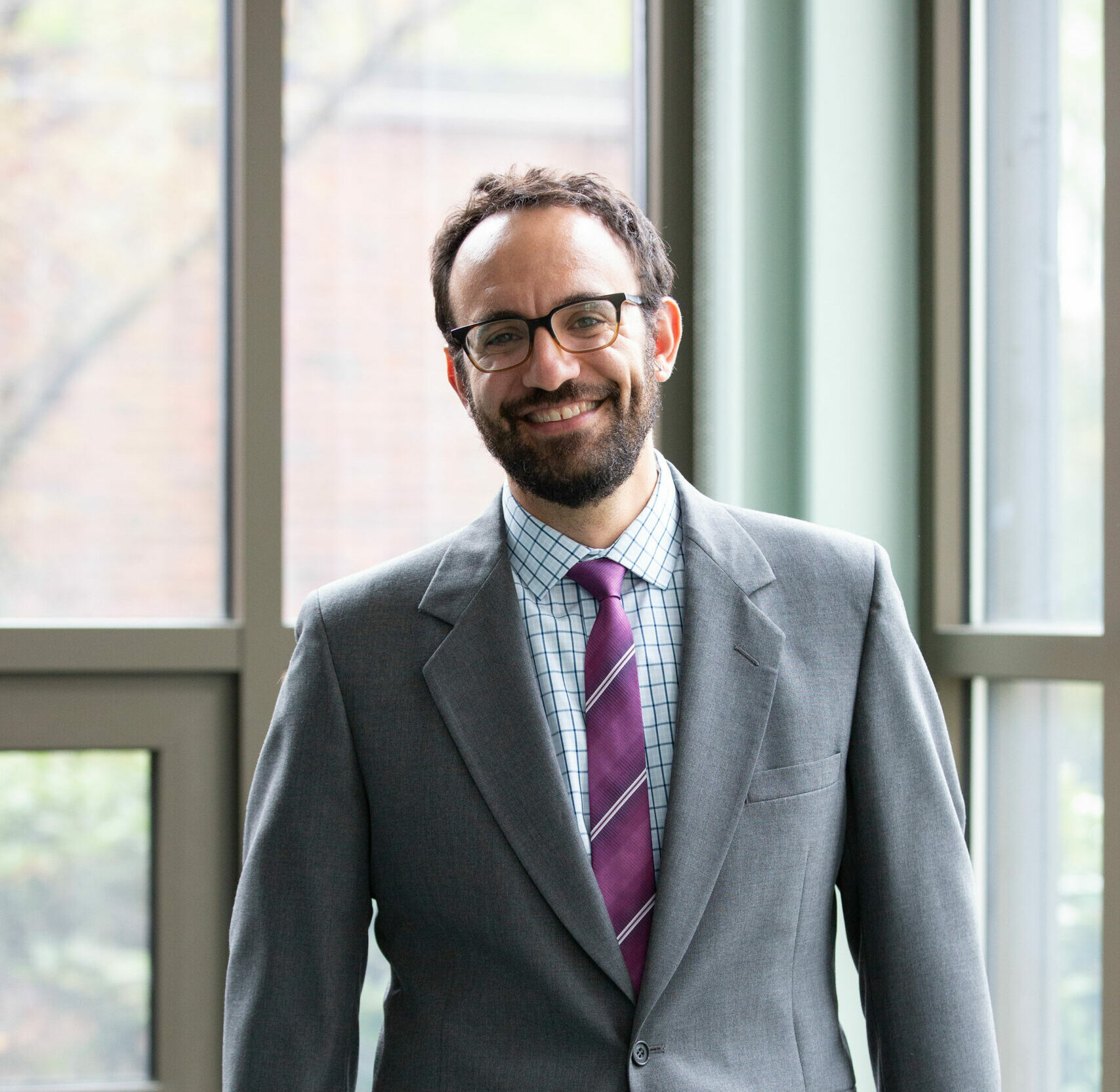
Alex Matthews
אֲדֹנָי שְׂפָתַי תִּפְתָּח וּפִי יַגִּיד תְּהִלָּתֶֽךָ
Adonai, bring words to my lips, let my mouth declare your praise.
Psalm 51:17
translation by Dr. Joe Rosenstein
ִ֥צוּרִ֥י וְגֹאֲלִֽי׃
May the prayers I speak and the awareness in my heart be transparent to you, God! Please support and free me.
Psalm 19:15
translation by Reb Zalman Schachter Shalomi
These two verses from Psalms bookend each and every private Amidah we offer. The Amidah is the ancient prayer, its liturgical framework established thousands of years ago. Yet, as these verses imply, the experience of praying is so much more than simply reading words off the pages of the prayerbook. As Reb Zalman teaches, “The act of speaking directly to God, of opening our hearts to God’s response, is one of the ultimate mystical experiences.” Our prayer experiences, and our Jewish spiritual lives, exist in the balance between kevah and kavanah—set practice and heartfelt intention.
My time at Hebrew College has taught me the importance of bringing those two forces into equilibrium. It has been liberating and exhilarating to move from a Judaism of right and wrong, of rote recitation, of an Amidah silently set in stone, of rules and, too often, guilt, to a world of expanding personal practice and discovering meaning, praying in English and with poetry, and even singing the occasional niggun.
Perhaps the most important message I take from these verses from Psalms is that we need to be the ones to start the conversation. We must be willing to speak and know that God is willing to listen. Prayer, learning, teaching—everything encompassed in the broad category of Torah—these come alive and impact us most when we are in community with each other and simultaneously striving to be in relationship with the Divine. At times we’ll be called to speak and act, other times to listen and witness. Standing alongside others as we build kavanah together and helping others in Klal Yisrael along their own paths of discovery is a tremendous privilege, one I am eager and honored to tackle in my role as rabbi.
There are lots of people who have helped me along my own path and helped me find my own voice. I want to thank my family for supporting me all along the way. It was a gift of the Zoom era that I got to be a regular rabbinic presence for my parents and siblings across state lines. I’m also so appreciative of the support of my congregants who AREN’T related to me: the community of Congregation Ahavas Achim in Newburyport. Thank you for believing in me and for being willing to let me grow alongside you.
I am grateful for the mentors to whom I will continue to turn to guide me forward: Rabbis Barry Dov Katz, Avi Poupko, Ben Resnick and Erica Asch and CPE guru Cheryl McDevitt. To the faculty, alumni and students of Hebrew College, and especially my classmates, thank you for the Torah you’ve shared and inspired. My chevrutot have supported me, challenged me and invited me alongside them in ways that I will be appreciating for years to come. And finally, Mac, I know no one is more excited about this graduation than you. You got engaged to a farmer and wound up marrying a rabbi—who saw that coming?! Thanks for being there for me and with me every step of the way.
Placement
Rabbi, Congregation Ahavas Achim (Newburyport, MA)
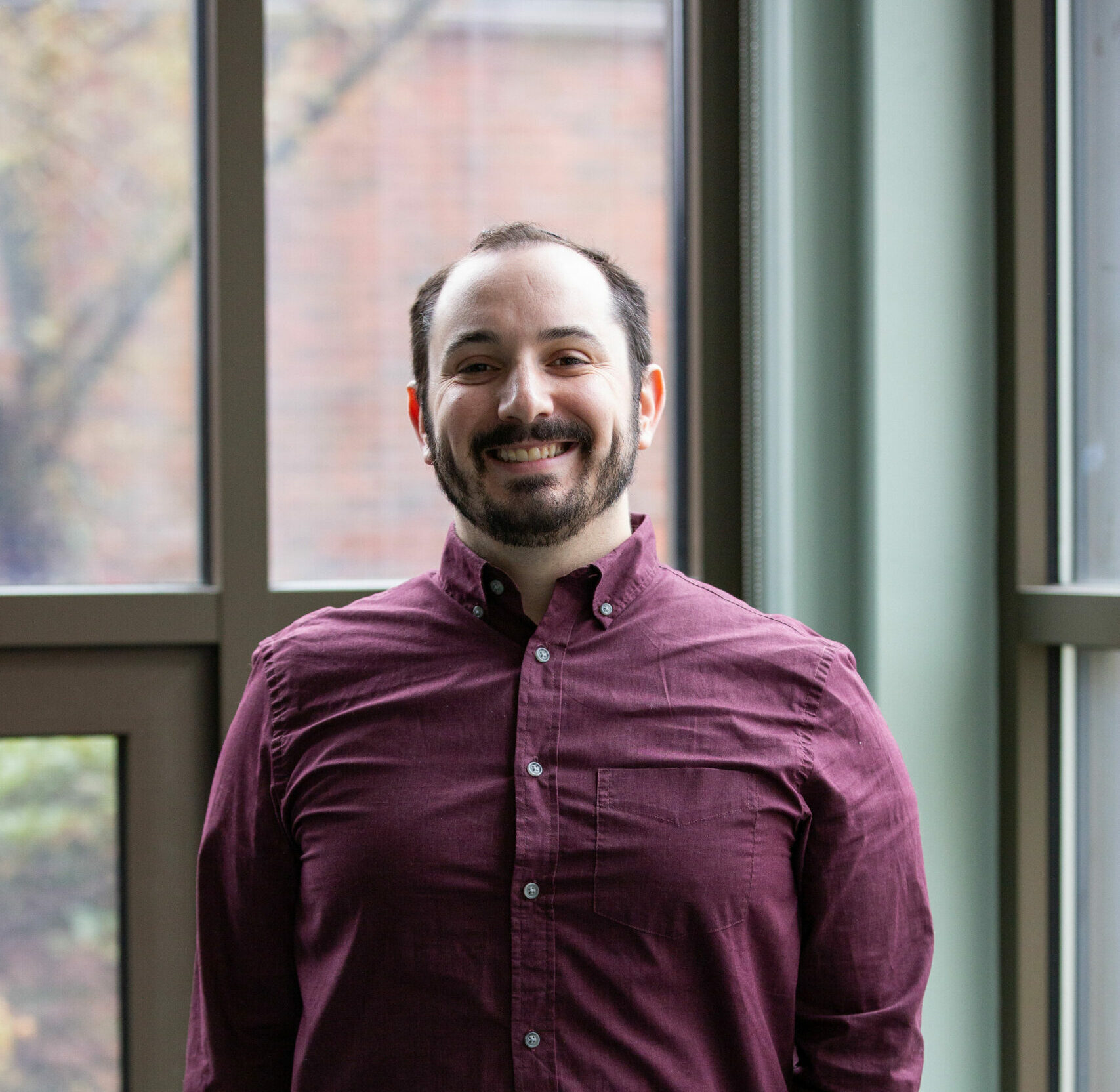
Jackson Mercer
וְהָאוֹמֵר דָּבָר בְּשֵׁם אוֹמְרוֹ, הָא לָמַדְתָּ שֶׁכָּל
הָאוֹמֵר דָּבָר בְּשֵׁם אוֹמְרוֹ מֵבִיא גְאֻלָּה
לָעוֹלָם, שֶׁנֶּאֱמַר (אסתר ב) וַתֹּאמֶר אֶסְתֵּר לַמֶּלֶךְ
בְּשֵׁם מָרְדֳּכָי:
Pirkei Avot 6:6
Saying [a thing] in the name of the one who said it; for you learned that one who says something in the name of the one who said it brings redemption to the world, as it says, ‘Esther told the king in Mordekhai’s name.’
Esther 2:22
Me’or Einayim on Talmud Bavli Shabbat, “In our generation, when we study the words of the tana’im or any of the ancient masters, we must realize that those words contain the vitality and inner-core of that Sage. When you study and speak the words of that Sage, if you connect yourself and invest your own vitality and inner core into the words, this is a connection of spirit to spirit. Thus, you revive that Sage, as you reinsert life into the words. This is why we are taught: ‘When a teaching is said in the name of a Sage, in this world, the lips of the deceased murmur in the grave.’”
Yevamot 97a
This text from the Mishnah and this exegetical interpretation from Rabbi Menachem Nachum of Chernobyl, the Me’or Einayim, paints a vision of Jewish education as a magical elixir of lasting life. What we teach holds an essence of ourselves and when our corporeal form ceases, we live on through ideas, words, melodies, images, conversations. Being at Hebrew College was an opportunity to commune with fragments of my heritage, my family tree, and my own identity previously undiscovered. It has allowed me to enter into a temporal—boundless conversation with those lasting remnants of the essence of our ancestors. To learn and to teach the texts of our tradition is to harmonize with the choirs of Heavenly Hosts above, with the Levites in the Temple thousands of years ago, amidst wooden pews of Lauderdale Road, in the cacophony of the rotunda of Olin Sang Ruby Union Institute, contributing our own voice, which only we can, while learning the timbre of our ancestors. To begin my rabbinate is to set out on the ultimate journey of connecting the past with the future, for myself and others, coordinating a divine family reunion across time and space.
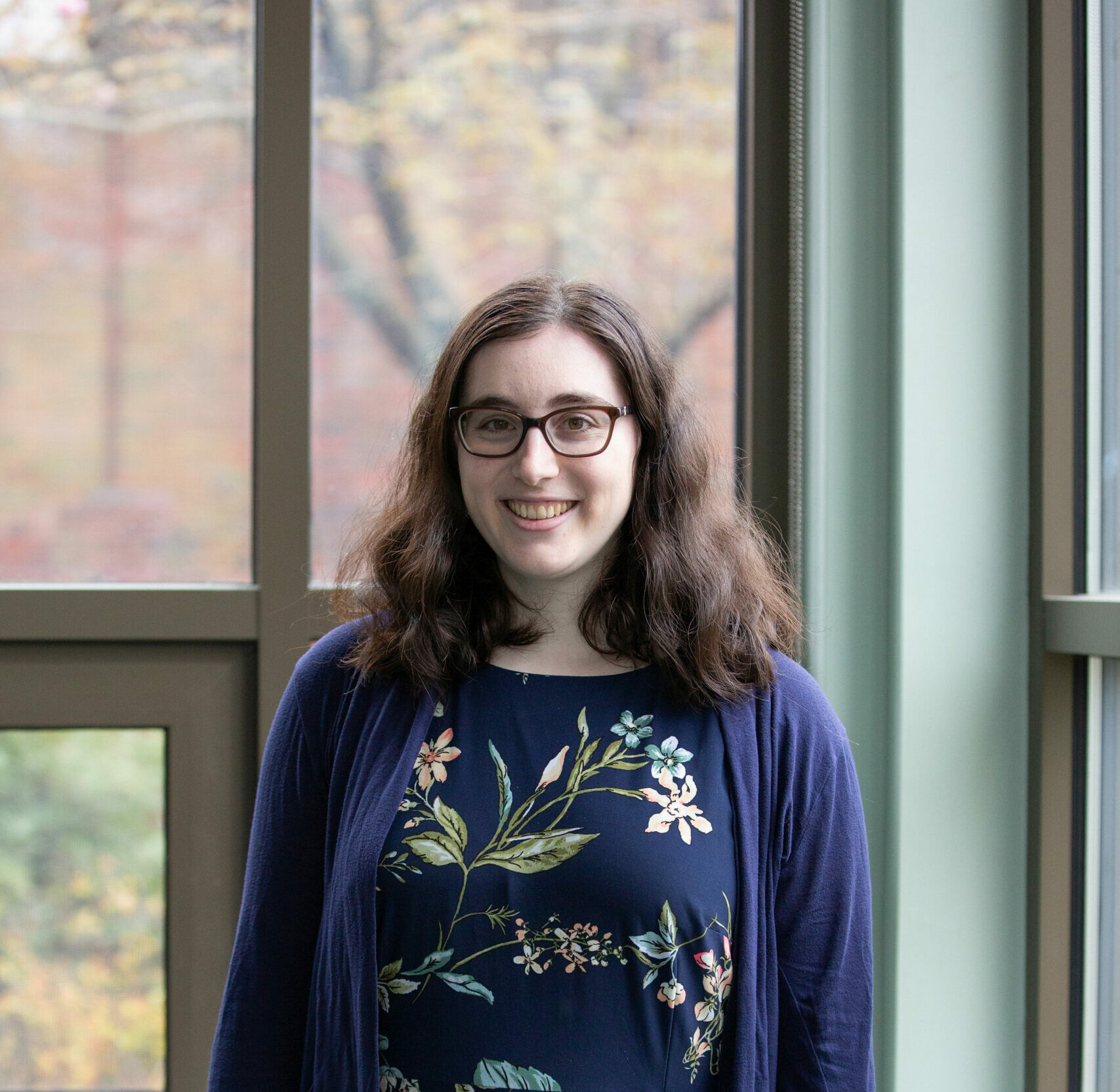
Kochava Munro
לְ֭כוּ נְרַנְּנָ֣ה לַיהֹוָ֑ה נָ֝רִ֗יעָה לְצ֣וּר יִשְׁעֵֽנוּ׃
נְקַדְּמָ֣ה פָנָ֣יו בְּתוֹדָ֑ה בִּ֝זְמִר֗וֹת נָרִ֥יעַֽ לֽוֹ׃
Come, let us sing joyously to Adoshem,
Raise a shout for our Rock and Deliverer.
Let us come into God’s presence with praise,
Let us raise a shout for God in song!
Psalm 95: 1-2
Singing has been a constant companion throughout my life. As a daughter of a cantor, I was immersed in Jewish secular and liturgical music from a young age. In my neshama—my soul—I knew that one day I would follow in my father’s footsteps. When I first experienced Tefillah at Hebrew College, I was astonished by the soulfulness and unity I felt during morning davening. I had never attended a Jewish service where every single person participated in song. Listening to the niggunim and beautiful contemporary melodies interspersed with the mumble of nusach broadened my perspective of the different ways one can engage in prayer.
I am blessed to have been a part of the Hebrew College community for the past four years. I strengthened my voice, not just physically, but also as a contributor to the discussion of Jewish texts, liturgy, and how I can form an intimate relationship with the Divine. Ultimately, I chose to write my Master of Jewish Education thesis on how clergy can integrate Neo-Hasidic niggun culture into synagogue life to create positive relationships and spiritual opportunities for congregants. Music can connect us to ourselves, build community, and be a conduit towards connecting with God. In my cantorate I hope to engage and inspire others through joyous song, kindness, and deep listening.
I want to thank all of the teachers and advisors who have helped me throughout my journey to the cantorate, guiding my professional and spiritual growth. An immense thank you to Cantor Lynn Torgove, my voice teacher, who worked with me over these past four years to broaden my vocal range, properly utilize my breath, and expand my repertoire. Thank you to Cantor Brian Mayer for working with me on nusach and encouraging me to find my inner voice through prayer and chazzanut.
Thank you to Dr. Joshua Jacobson for your masterful teaching of cantillation. You pushed me to bring the text to life through chanting; I will always treasure our class sessions. And thank you to the remaining cantorial faculty and faculty of the education department for improving my teaching and directing skills.
I am grateful for all the cantorial students who have supported and guided me. We are a small but mighty group! A final thank you to my family, especially my father, Cantor Wayne Krieger, my mother, Nancy Beller-Krieger, and my husband, Jacob Munro, for inspiring and supporting me throughout this process.
Placement
Full time Cantor, Congregation B’nai Jacob (Woodbridge, CT)
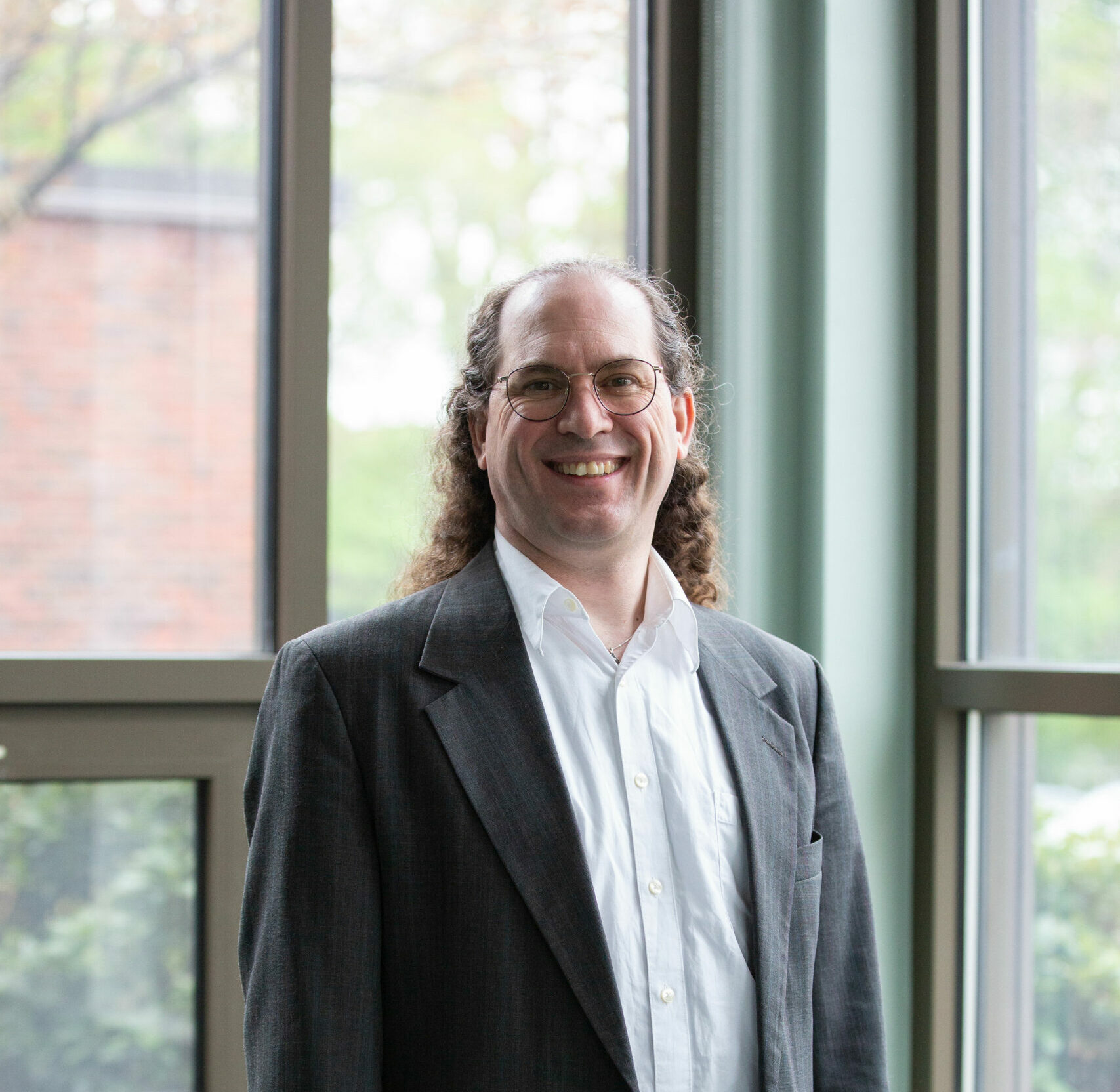
Josh Schreiber
שִׁ֗יר לַֽמַּ֫עֲל֥וֹת אֶשָּׂ֣א עֵ֭ינַי אֶל־הֶהָרִ֑ים מֵ֝אַ֗יִן יָבֹ֥א עֶזְרִֽי׃
A song of ascents: I lift my eyes to the mountains, from whence comes my help?
Psalm 121:1
Why does this sentence make intuitive sense? Why do we think of divinity as being “up” somewhere?
Does our Torah not also tell us “it is not in the heavens?”
Deut. 30:12
And yet, even to those of us uncomfortable with hierarchical notions of divinity, there is something undeniably resonant in these words, in this notion of lifting our eyes to holiness. It is as close to us as our own breath.
I would like to invite you to explore embodying this image:
Notice your breath for a few moments……. With no intention to breathe deeply, simply feel the air as it comes and goes, filling you and then falling away… Allow your head to rise and fall with the flow of your breath… Then, with your eyes either closed or open and unfocused, invite your gaze to become downcast as the breath goes out, then rise above the horizon as your head is lifted on the wave of your breath.
Ask yourself: what is the feeling that comes with the downcast eyes? What comes with the lifted eyes? For myself, as I write these words and explore this movement, I find a sort of introspection as I look down; and then, as I lift my eyes, I am experiencing a sense of fullness, and of something that is hard to put into words, perhaps involving hope—you might find different words for your experience. For me, both usually carry with them a sense of holiness.
When Hasidic masters speak of experiencing the holy, they often speak of pnimiyut, interiority, exchanging the metaphor of ascent for one of a journey inward, to find the divinity that resides within each of us. To me this means finding the holy in my own experience, seeking to literally embody the text before me. Rabbi Pinchas of Koretz taught: “People suppose that one prays before God. But this is not the case, for prayer is in itself divinity.” This is the ideal I strive for whether I am studying, teaching, praying, leading prayer, or engaging with community.
And even as I go inward to seek this connection, when I find it – to the extent I can in a given moment—I feel like it comes to me as a gift from without.
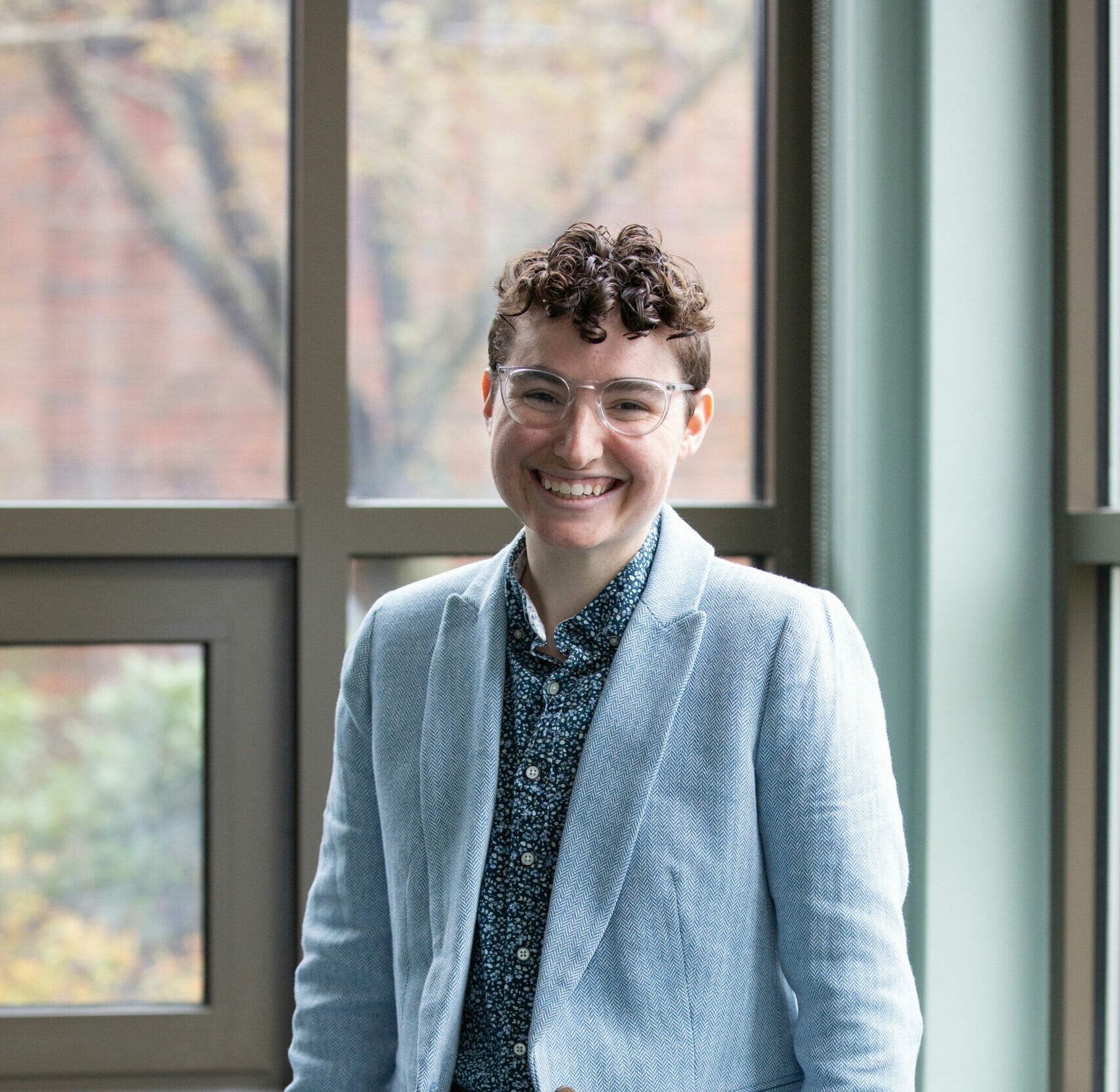
Jenna Shaw
V’ahavta—A creative adaptation
This was inspired by the themes of the interplay between love and teaching one’s children in the V’ahavta. I wrote this after a particularly meaningful class and it was shaped by my experiences running a religious school this past year.
The eyes light up, the anxiety turns to a half smile and then a full smile, and the student who sits in the back of the room with their hood on, grunting and refusing to participate, asks a question. It all starts with a spark. The most magical moment, the most humbling gift. The honor of a lifetime. To be the accompanier, cheerleader, detective, artist, and coach alongside a student is the ultimate act of love. Love for self, humanity, and God. And you shall love by teaching them diligently. To live out these words each day is more than leather on our arms or fringes on our garments. The ultimate way to show love is to teach. Not just teach by putting a book in front of a child and expecting them to internalize it, but to truly teach. Teach by seeing the gift that each student brings. To go on the magnificent, wonderful scavenger hunt into the soul of each student to discover what they love, what makes them tick, and what makes their eyes light up. This is the greatest honor and greatest responsibility. With all your heart and all your soul, you will reach within yourself to reach within someone else. Thank you for the gift of getting to do this each day.
.אֶבֶן מָאֲסוּ הַבּוֹנִים. הָיְתָה לְראשׁ פִּנָּה
The stone the builders rejected became the main cornerstone.
Psalm 118:22
If my ten-year-old (unknowingly queer) self, struggling to keep up in my day school Hebrew class, were watching this moment, they’d be shocked (and maybe a little confused). So much of my journey to and through rabbinical school has been shaped by wanting to be the teacher, role model, and rabbi my younger self needed. I deeply believe in a Judaism that welcomes and celebrates everyone’s voices. In the words of Pam Schuller, I believe in a Judaism that doesn’t ask what we have to do to include someone but what we get to do because someone is in our community.
I’m humbly entering the rabbinate in a moment that calls for transformative change. As we watch terrifying legislation make its way to the mainstream, global attacks on democracy, and tremendous ecological devastation, I’ve learned from this text and beyond, that our tradition offers us hope and a framework for building a better and more just world. I’m unsure of what the future will look like, but I feel lucky to have learned at a place that celebrates me for my unique gifts and invites me to bring my most creative, radical, hopeful, and authentic self to the work, every day.
To my teachers—thank you for believing in me and being such amazing models of menschlekite, humility, and Torah learning. To Professor Lauren Strauss, thank you for being the first person to help me understand what it means to be a “text person.” I feel lucky to have had you by my side through this entire journey. To my friends and cohorts near and far, in the words of (my rav) Rachel Maddow, “If you’re someone people count on particularly in difficult moments, that’s a sign of a life lived honorably.” Thank you for every laugh, shoulder to cry on, piece of advice, and sports game watched together. To my family, there are not enough words and ways to say thank you! Thank you for being by my side through everything, offering a non-judgmental ear, lighting Shabbat candles together every week, and being my High Holidays cheering squad. I’m particularly remembering my grandpa, Murray Gordon z’l, who always wanted to have the first aliyah when I became a rabbi. To Heather, thank you for holding me, encouraging me, and loving me every single day since we first met in line for food at Orientation.
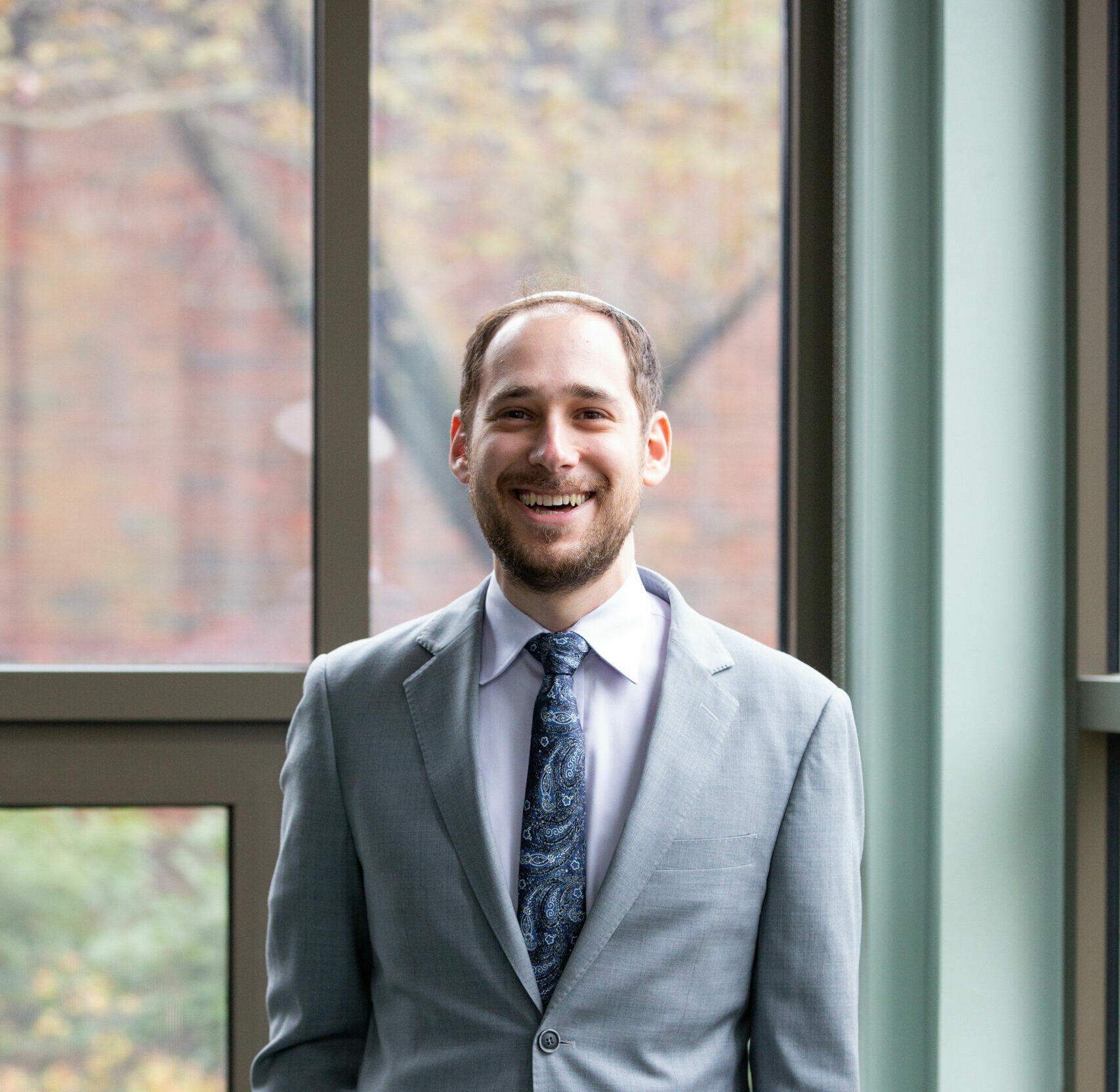
Danny Stein
עֵץ חַיִּים הִיא לַמַּחֲזִיקִים בָּהּ וְתוֹמְ֒כֶֽיהָ מְאֻשָּׁר
דְּרָכֶֽיהָ דַּרְכֵי נֹֽעַם וְכָל נְתִיבוֹתֶֽיהָ שָׁלוֹם
הֲשִׁיבֵֽנוּ ה׳ אֵלֶֽיךָ וְנָשׁוּבָה חַדֵּשׁ יָמֵֽינוּ כְּקֶֽדֶם
She is a Tree of Life for all of those who cling to her, and those who support her are fulfilled.
Her paths are pleasing, and all of her branches are peaceful.
We will return to you God and be returned, renew our days like kedem.
Proverbs 3:18, 17 and Lamentations 5:21
This poem, which is recited as we return the Torah to her ark, is often accompanied by a beautifully calming melody. After reading from our tradition’s holiest scroll, we are reminded of The Tree of Life (Torah)’s beauty. Like a tree that provides shade on a hot day, Torah provides me with comfort. Like plants that beautify my home, Torah adds light to my life. Like a calming walk on a path along the Charles River, she is there to guide me towards peaceful understanding.
The expansiveness of Torah, which includes not just the Five Books of Moses, but also the entirety of Jewish tradition, has been a life-giving source for me throughout my time at Hebrew College. I have been comforted by Torah’s paths through communal prayer, ḥevrutot (learning partners), hospital chaplaincy, justice efforts, foundational experiences with Northeastern University Hillel, Temple Beth Zion, and Boston University Hillel, as well as innumerable, wonderful, lessons from the Hebrew College faculty, staff, and student body.
I would not have been able to feel the embrace of our tradition so closely these last five years if it were not for the unwavering support of my wife Tamara, who constantly reminds me of life’s wonderfulness. My parents, David and Erin, instilled in me a love of learning and Jewish community. My in-laws, Liz and Deon, have lovingly supported me as I continuously walk along this path. I am grateful to my friends and family, who have been a constant source of encouragement. Our wonderful cohort, including our beloved classmates Jill Segal z’’l and Lea Andersen z’’l, is a community filled with lovers of Torah. I will always be inspired by this group that truly clings to Torah’s paths.
“We will return to you God and be returned, renew our days like kedem.” This poem ends with a desire to experience kedem. While kedem could mean “the beginning,” here in its context, I view it as a time full of peace and prosperity for all. Kedem is a moment when our highest values are actualized in this world; it is the fulfillment of Heaven on earth. My experiences at Hebrew College have shown me that Torah is always a taste of kedem. She reminds me that I am a part of something greater than myself, and I am eternally grateful for this ongoing gift of Torah.
Placement
Rabbi, BASE NY
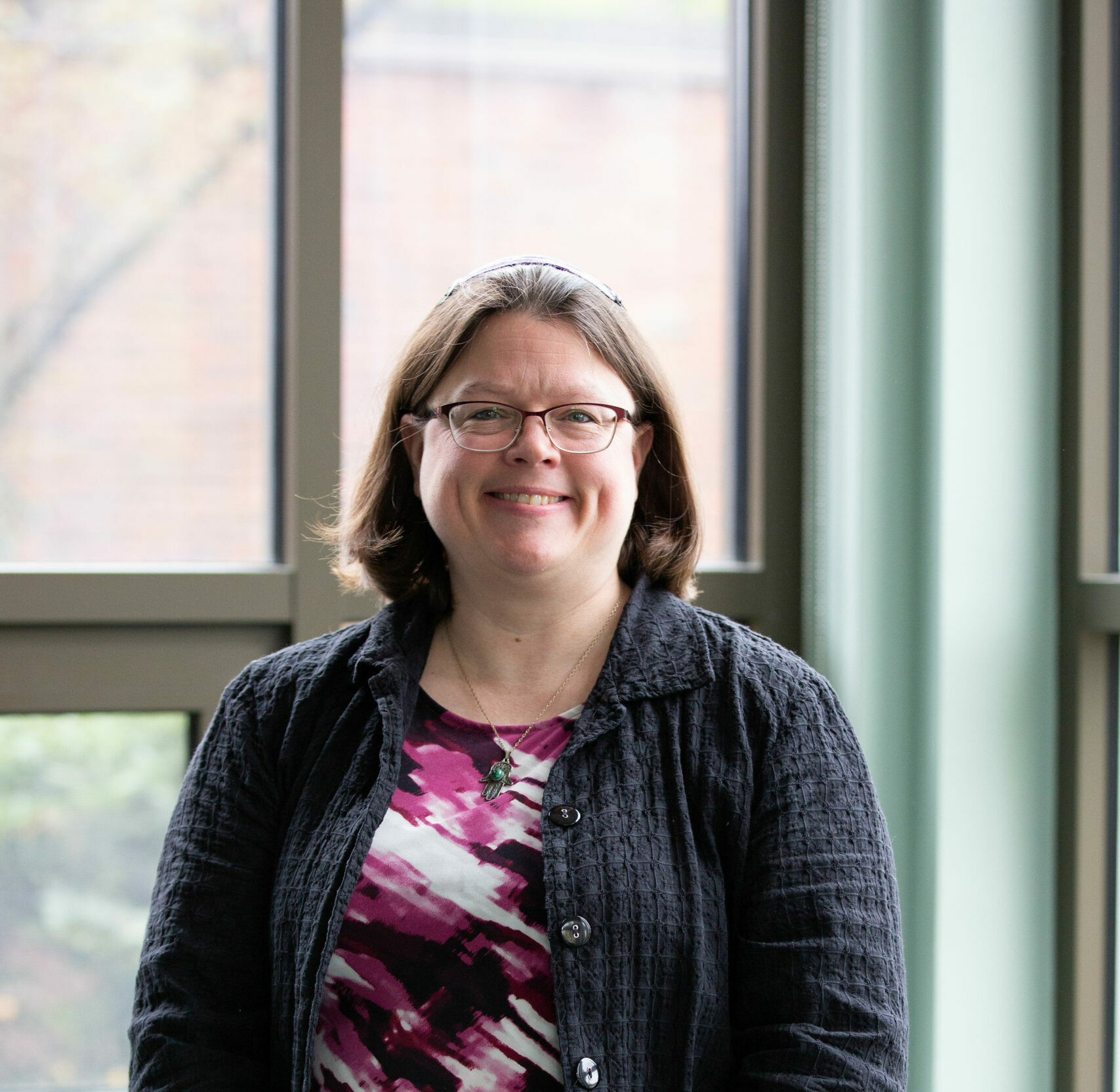
Ashira Stevens
Let me explain. No, there is too much. Let me sum up.
— Inigo Montoya, The Princess Bride
How can I begin to describe the transformative experience of the past five years while looking ahead to my still-being-formed rabbinate and adequately express my profound gratitude for everyone who supported me to reach this moment?
הִנֵּ֧ה יְהוָ֛ה בֵּינִ֥י וּבֵינְךָ֖ עַד־עוֹלָֽם׃
Here God is, between you and me forever and always.
1 Samuel 20:23
When King Saul set out to kill David as a last-ditch effort to remain in power, David fled from court and hid. Saul’s son and David’s beloved friend Jonathan spoke these words to David as assurance of the promise to inform him of Saul’s intentions and to protect him from harm. Jonathan’s words acknowledge the holiness of their relationship, and it is through the strength of their relationship that David remains safe from Saul’s attempts to kill him.
Along my journey to the rabbinate, personal relationships have shaped my learning and growth more than anything else. Much like what Jonathan said to David, it has been my experience that the Divine Presence manifests in that sacred space between people and in the love and care we give to each other.
To the many classmates with whom I have learned, thank you for the blessing of your questions, insights, and deep listening which nurtured me and deepened my understanding of our texts and traditions. My chevrutot have lived the words from Proverbs, “As iron sharpens iron, so a person sharpens the wit of a friend.”1
To my amazing teachers at Hebrew College, thank you for opening the world of Jewish sacred text, thought, and practice. From the beginning of my studies, you encouraged me to bring my full self into the work, and you reminded me that our sages teach, “The bashful do not learn.”2 Thank you for the invaluable gift of helping me to find my place in the text and encouraging me to add my voice to the holy conversations.
To my patient internship mentors, thank you for providing me the opportunity to learn, to practice, and to discover what makes my heart sing. Thank you also for sharing the wisdom of your experience so that I might stand on your shoulders going forward.
To the community of Congregation Beth El of the Sudbury River Valley, thank you beyond measure for giving me the space and time for spiritual healing and discernment which led me to this path. You have been my spiritual home, where I have been able to come as I am since the first time I entered.
To my dear friends from so many parts of my life, thank you for accompanying me and cheering me on. Your support came in many forms and often appeared when I or my family most needed it. You nourished me and held me, often quite literally. You listened to me when I struggled and when I soared.
To my family—first to Aaron—you didn’t sign up for this wild ride, and I will be eternally grateful for your patience, flexibility, and encouragement. I do not have the words to describe all of the ways you made it possible for me to pursue this path. From managing our household to providing emotional support and beyond, you have been the cornerstone of my dream. Caleb, Ellie, and Jacob—thank you for listening to my geeky ramblings and especially for your perspectives on teaching and learning. I am so proud and blessed to be your parent.
As I go forth from the shelter of the Beit Midrash, I look forward to the opportunity to cultivate new relationships through which divine blessings can abound. May it be that the Divine Presence continues to flow through all of our relationships forever and always.
1 Proverbs 27:17
2 Pirkei Avot 2:5
Placement
Rabbi, Temple Emanu-El (Haverhill, MA)
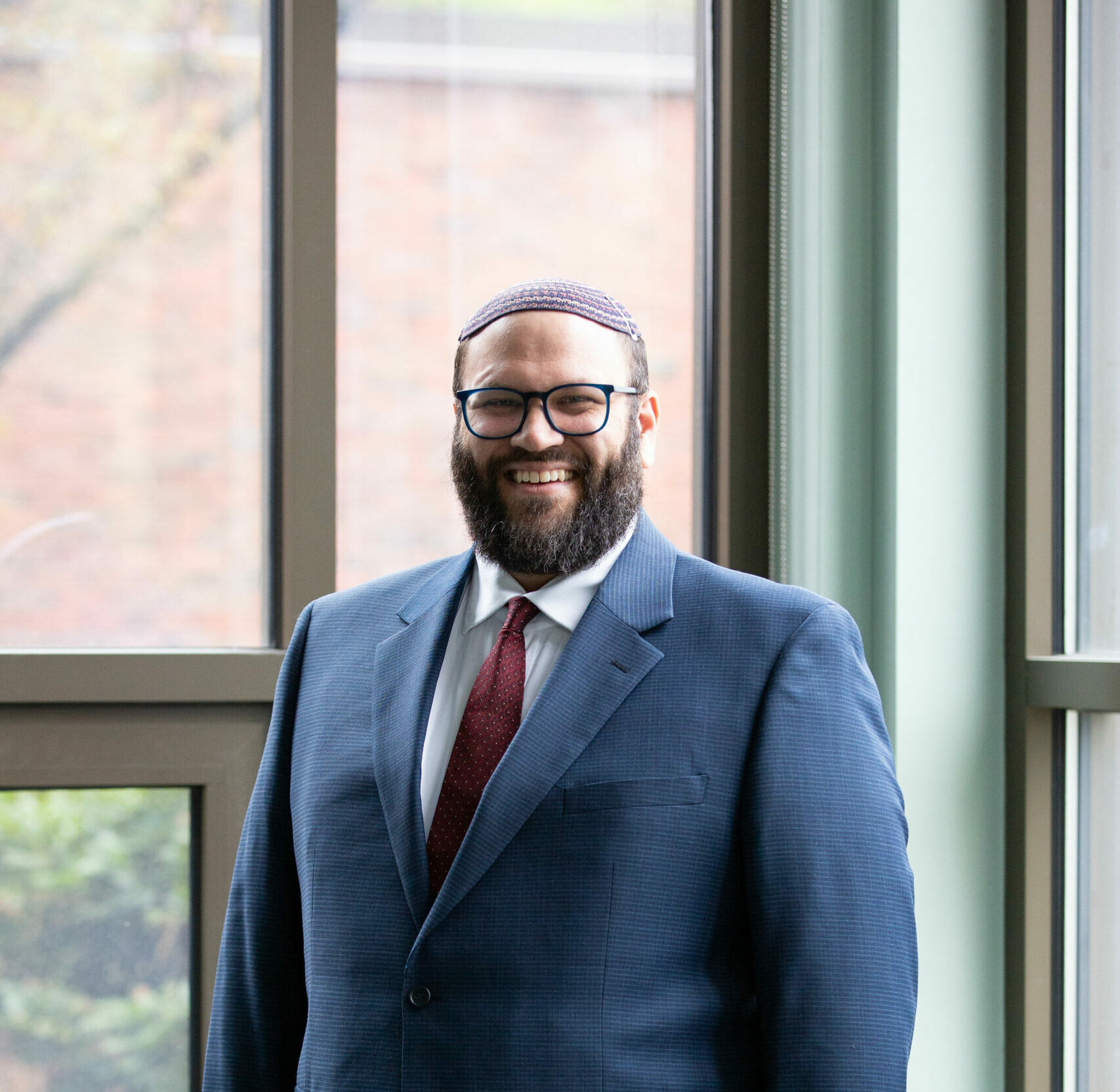
Moshe Webber
.פְּתַח לִבִּי בְּתוֹרָתֶךָ, וּבְמִצְוֹתֶיךָ תִּרְדּוֹף נַפְשִׁי
Berakhot 17a
These powerful sacred words appearing just after the end of the Amidah, said in a quiet whisper, hold, for me, an essential ambiguity that has been both a source of strength and focus during my time at Hebrew College. “Open my heart to Your Torah and let my soul pursue Your Mitzvot,” is how these words are commonly translated. This is a profound statement that sets an intention to pursue a life devoted to study and mitzvot. However, the latter half of the sentence is actually not totally clear in the Hebrew. For it can be translated differently, “Open my heart to Your Torah so that You seek my soul through our Mitzvot.”
Who is in pursuit of who? Does Torah so deeply impact us that we desire to live a holy life of obligation? Or, alternatively, do we find in every sacred act the presence of the Holy Blessed One, seeking us, calling out to us? I think the answer is clearly both. At one level, for me, these words hold the force of obligation and the imaginative vision of aspiration. That is to say, these words obligate me to act in the world in concrete ways, but also provide a vision of continuous and endless seeking that much like the horizon is stunningly just out of our reach. On the other hand, these words express a theology of God seeking after me; a God who is met with every sacred word and every sacred act.
These poetically ambiguous words speak to how the Torah opens my heart to seeking after God and God seeking after me. This speaks to the centrality of Torah learning. For me, learning has been such a deep part of my journey. In fact, one of the main reasons that I chose to attend Hebrew College is because the living center and core is the Beit Midrash. I have been so deeply enriched by my teachers, my cohort, my friends, my rabbinic mentors, and all of those who over the years have populated, learned, sung, cried, danced, and let Torah open their hearts in our Beit Midrash. For me, this recalls the words of Devarim, the Book of Deuteronomy, that are found in the first paragraph of the Shema,
וְהָי֞וּ הַדְּבָרִ֣ים הָאֵ֗לֶּה אֲשֶׁ֨ר אָנֹכִ֧י מְצַוְּךָ֛ הַיּ֖וֹם עַל־לְבָבֶֽךָ…וּקְשַׁרְתָּ֥ם לְא֖וֹת עַל־יָדֶ֑ךָ וְהָי֥וּ לְטֹטָפֹ֖ת בֵּ֥ין עֵינֶֽיךָ׃
And these words, which I have commanded you today, should be upon your heart. … Bind them as a sign on your arm and let them be as a symbol between your eyes.
Deuteronomy 6:6; 8
This not only refers to the ways that I bind myself with Torah by putting on tefillin, but, profoundly, over these last years, Torah has become a part of me, on my heart, bound to my arm, and affixed between my eyes. I cannot put into words the gratitude and honor I feel for my teachers who helped me do this and showed me the way by their examples. I feel an inexhaustible sense of gratitude to my cohort and my chevrutas who accompanied me in this journey, and lovingly pushed me to go further and grow. I feel so incredibly blessed to have worked with and learned from both Rabbi Arielle Lekach-Rosenberg and Rabbi Joey Glick at Shir Tikvah. The Torah I have received from them was truly transformative and has given me a vision of what it means to do this work with depth and care.
I am whole-heartily grateful for my parents, Ken and Bonnie, and my in-laws, Sherry and Mike, who have been so incredibly supportive throughout this entire journey, giving me encouragement throughout my time at Hebrew College. Most of all, I cannot express the immense and infinite gratitude and love I feel for my wife, Ariana, without whom I would not have had the courage or the inner strength to even go to rabbinical school in the first place or continue to stick with it when things got difficult. The love, support, and inspiration that Ariana and Toviah, my son, gave me during my time at Hebrew College is unparalleled and precious, and I cannot put into words what it has meant to me.
Placement
Rabbi, BASE Chicago

